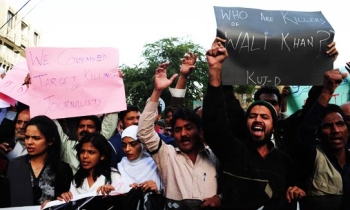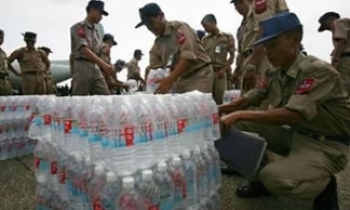WASHINGTON -- Attention, fellow journalists: Special prosecutor Patrick Fitzgerald has blown our cover.
In his argument for why New York Times reporter Judith Miller should be jailed until she tells a grand jury who revealed the name of a CIA operative to her, Fitzgerald stated that "journalists are not entitled to promise complete confidentiality. No one in America is."
He's right. But what's really troubling is how the right of reporters to keep sources confidential has eroded in recent years.
We Americans like to think that conversations between reporters and anonymous whistle-blowers are almost as privileged as those between doctors and patients, priests and penitents, patients and psychotherapists and, let us not forget, lawyers and clients.
In fact, Fitzgerald is correct in saying that, contrary to popular belief, none of these professional relationships has "complete" or "absolute" privilege. Lawyers can be forced to divulge their clients' secrets under a court order. All of those confidential relationships have had their privileged conversations whittled away in recent years by statutes, court decisions and increasingly aggressive prosecutors.
More and more doctors and therapists are being forced to open their files in lawsuits and insurance claims. In recent years, more than 20 states have passed laws requiring clergy to report evidence of child abuse, even if the incident was disclosed during a confession or similarly private consultation.
And journalists? In today's politically charged, beat-up-the-press era, respect for our traditional confidentiality privileges hardly stands a chance. Over the last year and a half, nearly two dozen broadcast and print reporters have been subpoenaed or questioned about their confidential sources, according to the Newspaper Association of America. The NAA is among a long list of media organizations supporting a proposed federal "shield law" that would protect journalists from being forced to reveal confidential sources. House and Senate versions of the bill have been stalled in Congress since their introductions in February.
Of course, if less confidentiality helps bring murderers or child abusers to justice, that's hardly a bad thing. However, prosecutors should limit such intrusions on confidentiality to serious felony investigations and only as a last resort weighed carefully against other rights, such as the 1st Amendment.
Such were the standards set by the Supreme Court's important Branzburg vs. Hayes decision in 1972, which found that journalists do not have the privilege to avoid testifying before a federal grand jury. Two years earlier, the Justice Department adopted similar guidelines that call for prosecutors to leave reporters alone unless they have no other way of obtaining evidence for a prosecution.
But those sensible principles were trampled upon in the shameful jailing of freelance writer Vanessa Leggett in 2001 for 168 days for refusing to cough up notes for a book she was compiling on a Houston murder.
In the end, there may have been no need for her information at all. Four days after her release on Jan. 4, 2002, when the federal grand jury ended its investigation of suspected murderer Robert Angleton without handing down an indictment, the U.S. attorney empaneled another grand jury to investigate. It managed to hand down an indictment in 16 days without subpoenaing Leggett or her records.
Looking back, it is particularly disturbing how little attention the courts paid to the controversial actions of the federal prosecutors and whether the value of Leggett's notes was worth the infringement of her 1st Amendment rights.
Similar questions are raised by the case of Judith Miller, sitting in jail for refusing to testify about a confidential source. Fitzgerald was named special prosecutor by the Bush administration to find out whether White House officials revealed CIA agent Valerie Plame's identity to columnist Robert Novak, a disclosure that violates the Intelligence Identities Protection Act of 1982. That law prohibits government officials, but not reporters, from knowingly revealing the identity of undercover intelligence agents. Perhaps, in the end, Fitzgerald can show us all that the jailing of Miller was worth it. So far, I doubt it.
In the meantime, it has become chic among some of my colleagues to berate Miller for refusing to violate her confidence or to quietly work something out with the prosecutor, whatever that means.
I admire her stubbornness. She's not above the law, she's taking her stand and serving her time, becoming an odd sort of martyr to the value of a feisty, independent press.
It is a value older than the Republic. Newspeople, including James Franklin, the brother of Benjamin, have refused to reveal the names of confidential sources since colonial times. It is a value enshrined in the 1st Amendment. These days it is a value that is becoming seriously endangered.
Fitzgerald is right in saying that journalists are not entitled to promise complete confidentiality as a matter of law. But some of us are willing to do it anyway, if only as a matter of conscience.









